|
|
|
Sort Order |
|
|
|
Items / Page
|
|
|
|
|
|
|
| Srl | Item |
| 1 |
ID:
192487
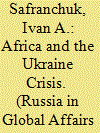

|
|
|
|
|
| Summary/Abstract |
The scale and global consequences of the Ukraine crisis do not allow even
countries that are not directly involved in the standoff to ignore it. Most
members of the international system have to respond to the current events
and formulate their position on the conflict. When analyzing these positions,
the epistemic community tries to explain what stands behind different
reactions to the crisis. The focus of academic work varies from the attitude
of a single country to cross-country comparisons. This paper, pertaining to
the latter category, presents a coordinate system to map the international
reaction to the Ukraine crisis, with special attention to African states. Using
the methods of cluster, correlation, and regression analyses, the authors
present an overall picture of the international reaction to the crisis over
time and highlight factors that can influence the positions of states. The
results show that the positions of African states cannot be easily explained
by material factors, but are rather the consequence of political choice, and
hence are subject to change. African states gravitate towards a neutral
position to stay equidistant from both sides in the confrontation. The
authors conclude that assertive attempts by the great powers to persuade
African states to solidarize with their positions may prove abortive.
|
|
|
|
|
|
|
|
|
|
|
|
|
|
|
|
| 2 |
ID:
137446
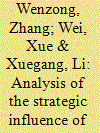

|
|
|
| 3 |
ID:
130322
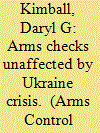

|
|
|
|
|
| Publication |
2014.
|
| Summary/Abstract |
Although the widening confrontation over the political future of the Crimean peninsula and other parts of the former Soviet Union has ruptured already-strained relations between Moscow and the West and put at risk the implementation of some nuclear risk-reduction initiatives and agreements, Russia is not planning to stop allowing the on-site inspections required under the 2010 New Strategic Arms Reduction Treaty (New START), Russian officials said last month. To protest Russia's actions to take control of Crimea, the seven non-Russian members of the Group of Eight (G-8) industrialized countries have suspended Russia's membership in the group. As part of that decision, the seven countries-Canada, Italy, France, Germany, Japan, the United Kingdom, and the United States-changed the location of their planned June summit from Sochi to Brussels. The Russian actions in Crimea have disrupted planning for the activities of the Global Partnership against the Spread of Weapons and Materials of Mass Destruction, which the G-8 launched in 2002.
|
|
|
|
|
|
|
|
|
|
|
|
|
|
|
|
| 4 |
ID:
130356
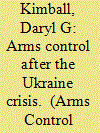

|
|
|
|
|
| Publication |
2014.
|
| Summary/Abstract |
The Global Nuclear Disarmament and risk reduction enterprise is at a crossroads as U.S.-Russian relations have reached perhaps their lowest point in more than a quarter century. Nevertheless, it remains in U.S. and Russian interests to implement existing nuclear risk reduction agreements and pursue practical, low-risk steps to lower tensions. Present circumstances demand new approaches to resolve stubborn challenges to deeper nuclear cuts and the establishment of a new framework to address Euro-Atlantic security issues.
Even before the recent political turmoil in Ukraine and Russian President Vladimir Putin's extralegal occupation and annexation of Crimea, relations between Moscow and Washington were chilly. Despite U.S. adjustments to its missile defense plans in Europe that eliminate any threat to Russian strategic missiles, Putin rebuffed U.S. President Barack Obama's proposal last June to reduce U.S. and Russian strategic stockpiles by one-third below the ceilings set by the New Strategic Arms Reduction Treaty (New START).
Moving forward will be difficult, but doing nothing is not an option. Through earlier crises during and after the Cold War, U.S. and Russian leaders pursued effective arms control and disarmament initiatives that increased mutual security and significantly reduced the nuclear danger. Much has been achieved, albeit too slowly, but there is far more to be done.
As the world's non-nuclear-weapon states persuasively argue, U.S. and Russian stockpiles still far exceed any plausible deterrence requirements, and the use of just a few nuclear weapons by any country would have catastrophic global consequences. As the 2015 Nuclear Nonproliferation Treaty (NPT) Review Conference approaches, pressure to accelerate action on disarmament will only grow.
For now, neither Russia nor the United States wants to scrap the existing arms control regime, including New START and the Intermediate-Range Nuclear Forces (INF) Treaty, which provide greater predictability and stability in an otherwise strained bilateral relationship. A return to a period of unconstrained strategic nuclear competition would not only deepen the distrust and increase dangers for both sides, but also would undermine the NPT. Scrapping the existing nuclear risk reduction measures would do nothing to protect Ukraine from further Russian aggression or reassure nervous NATO allies.
Unfortunately, the profound tensions over Ukraine delay the possibility of any formal, bilateral talks on nuclear arms reductions and missile defense. In light of these realities, Obama and other key leaders must explore alternative options to reduce global nuclear dangers and defuse U.S.-Russian strategic tensions.
|
|
|
|
|
|
|
|
|
|
|
|
|
|
|
|
| 5 |
ID:
132081


|
|
|
|
|
| Publication |
2014.
|
| Summary/Abstract |
The NATO summit in Wales will be one of the most important since the Cold War ended - the first such summit after what is, undeniably, the end of the post-Cold War era. The goals of transitioning Afghanistan operations, preparing NATO for future challenges, and cementing the transatlantic bond have all been lent urgency by the crisis in Ukraine and the collapse of positive relations with Russia. James Bergeron explores where NATO has been on its twenty-five-year journey through the post-Cold War era and surveys the strategic challenges that the Alliance now confronts.
|
|
|
|
|
|
|
|
|
|
|
|
|
|
|
|
| 6 |
ID:
188302


|
|
|
|
|
| Summary/Abstract |
Following the 2014 Ukraine crisis, Belarus and Kazakhstan appear caught in an alliance security dilemma characterised by intra-alliance threat and entrapment, as both are potential targets of militarised hybrid warfare by their vastly more powerful ally, Russia. Despite having sought foreign policy flexibility between the two increasingly opposed geopolitical camps of the West and Russia, Minsk and Nur-Sultan appear drawn further towards Moscow. Utilising their pre- and post-2014 national security documents, reinforced by an examination of their rhetoric and policies, this essay demonstrates how both countries reassessed their security environment in the wake of the annexation of Crimea and the initial war in the Donbas region.
|
|
|
|
|
|
|
|
|
|
|
|
|
|
|
|
| 7 |
ID:
153489
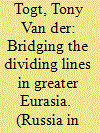

|
|
|
|
|
| Summary/Abstract |
In recent years, we have witnessed increased competition and divergence in development between two forms of regional integration, the European Union (EU) and the Eurasian Economic Union (EEU). This reached a climax in the Ukraine crisis, the most important geopolitical conflict between Russia and the West in the post-Soviet space. Geopolitics is back with a vengeance and now also has serious geo-economic consequences.
|
|
|
|
|
|
|
|
|
|
|
|
|
|
|
|
| 8 |
ID:
132082
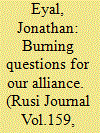

|
|
|
|
|
| Publication |
2014.
|
| Summary/Abstract |
Russia's annexation of Crimea and its actions in eastern Ukraine have led to a fundamental shift in Europe's security environment. Jonathan Eyal argues that NATO will have to find a way to reassure its Eastern European members without repudiating existing structures for co-operation with Russia.
|
|
|
|
|
|
|
|
|
|
|
|
|
|
|
|
| 9 |
ID:
141278
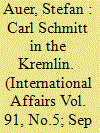

|
|
|
|
|
| Summary/Abstract |
The protracted crisis in Ukraine has exposed fundamental political differences between leaders in western Europe and their counterparts in Russia. The very existence of the European Union was meant to have refuted geopolitics as a useful theoretical lens through which to view power relations in Europe. After all, the European project is based on the idea that boundaries no longer matter and that national sovereignty is obsolete. And yet, geopolitics remains critically important—certainly for Europe's potential enemies, but also for Europe itself. It is poignant that to advance our understanding of this new constellation we are well served to turn to the insights of a classic, if hugely controversial, German political thinker: Carl Schmitt. Schmitt's political philosophy is relevant in three aspects. First, as a source of inspiration—even if only indirectly—for the contemporary Russian political establishment. Second, the behaviour of Putin's Russia, particularly since 2008, can be best understood through some of the key concepts that preoccupied Schmitt: sovereignty, the political and geopolitics. Third, Schmitt's philosophy can serve as a point of departure for reflecting on the possibility of a more robust response by Europe to the Russian intervention in Ukraine. What Europe needs is a more hard-nosed realist approach, which recognizes that Russia's expansionist ambitions can only be constrained by its own readiness and willingness to deploy power both politically and, if necessary, even militarily.
|
|
|
|
|
|
|
|
|
|
|
|
|
|
|
|
| 10 |
ID:
164500
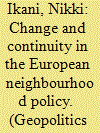

|
|
|
|
|
| Summary/Abstract |
The Ukraine crisis presented a severe geopolitical challenge to European Union (EU) policies in the neighbourhood. This is because during the course of the crisis, Russia openly challenged the EU’s economic and political integration initiatives in the region using economic, informational and eventually military means. As such, the crisis and its escalation has had ramifications across the EU in the fields of security, trade, energy security and regional cooperation. In the wake of the crisis, a clear rhetorical break with previous EU policy was announced by various key actors to respond to these challenges. Yet both the rhetoric and declared ambition for reform in response to the events is not matched by a major revision of actual policy objectives or policy tools. The question at the core of this article is how to explain the changes made to the European Neighbourhood Policy (ENP) following the Ukraine crisis. In order to provide an answer this article will build on historical institutionalism, exploring how two key historical institutionalist insights improve our understanding of the policy changes made to the ENP after the Ukraine crisis: (i) the institutional ‘effects’ and plasticity of the ENP institutions and (ii) temporal contingency. In doing so, this article takes issue with two tendencies in the current literature on policy change in the ENP. First, the lack of analytical engagement with the very notion of policy change, which throughout the literature is rarely defined or conceptualized. Second, the prevailing assumption that one should not be surprised that in the case of ENP reform after the Ukraine crisis there has been little change, due to the prevalence of policy inertia. It is argued that this oversimplifies both policy continuity and policy change. By paying particular attention to the decision-making process preceding change, this article thus aims to shed new light on the issue of EU foreign policy change.
|
|
|
|
|
|
|
|
|
|
|
|
|
|
|
|
| 11 |
ID:
197305


|
|
|
|
|
| Summary/Abstract |
This article discusses China’s approach to the Ukraine crisis and the factors that shape China’s attitude to this situation in the comparative timelines of the 2014 and 2022 crises. Despite the changes in China’s security perceptions and the balance of power in the international system, China’s rhetoric about the ongoing Ukraine crisis has vague rhetoric similar to the crisis in 2014. While China regards the 2014 Ukraine crisis as a regional crisis, it sees the recent situation as a crisis with global effects. China’s approach to the Ukraine crisis, which is on its way to becoming a global power, is shaped within the framework of multiple contradictory parameters. First, at the discursive level, the ‘five principles of peaceful coexistence’ have formed the discursive framework of Chinese foreign policy since the 1950s. Second, the rapidly developing China–Russia relations after the Cold War, and third, the increasing threat China perceives from the United States, which it sees as a global hegemonic power, and in this context, its global policies. As a result, it is possible to define China’s approach to the Ukraine crisis as passively pro-Russian.
|
|
|
|
|
|
|
|
|
|
|
|
|
|
|
|
| 12 |
ID:
160717
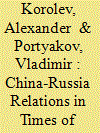

|
|
|
|
|
| Summary/Abstract |
Although not formal allies, China and Russia have steadily increased their strategic cooperation. However, crises and tensions in each other's areas of strategic interest continue to complicate each country's relations with the other and the rest of the international community. In this article we explore China's reaction toward major crises in the post-Soviet space (the Caucasus crisis of 2008 and the Ukraine crisis of 2014) and Russia's responses to the South China Sea dispute and show that they share many similarities. To explain the reaction patterns and better understand the nature of contemporary China-Russia relations, we apply a neoclassical realist framework, which helps assess the impact of both system-level and unit-level factors on great powers' behavior. The assessment demonstrates that the observed behavior pattern is an outcome of causal forces of different levels simultaneously pushing in different directions.
|
|
|
|
|
|
|
|
|
|
|
|
|
|
|
|
| 13 |
ID:
139024
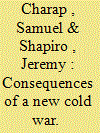

|
|
|
|
|
| Summary/Abstract |
The Ukraine crisis poses vexing policy challenges for Washington. President Barack Obama has sought to strike a balance between the imperative of responding to Russian actions and the equally important need to avoid an all-out confrontation with Moscow. As he put it in July 2014, ‘it’s not a new Cold War … [It] is a very specific issue related to Russia’s unwillingness to recognise that Ukraine can chart its own path.’ The problem is that the administration’s balancing act cannot last long. As the deterioration of conditions in Ukraine in recent weeks has demonstrated, forces beyond the president’s control are pushing him toward the very new Cold War that he wants to avoid. He will eventually face a choice between that outcome, which would be hugely dangerous and costly, and negotiations on a revised regional order in Europe, which might hurt him politically but would be far better for the United States and for the world. He should move toward the negotiated outcome now.
|
|
|
|
|
|
|
|
|
|
|
|
|
|
|
|
| 14 |
ID:
168581


|
|
|
|
|
| Summary/Abstract |
The geopolitical discourses of hegemonic actors dominate the inter-state system and are significant determinants of how international politics play out on the world stage. Particularly in terms of security discourses, peripheral nation-states are often considered to be pawns moved (or not) at the will of dominant nation-states across the grand chessboard of the world. This assumption, however, ignores the ability of peripheral and peripheralised nation-states to influence geopolitical agendas. Through a critical analysis of the US and Estonian discourses present during President Barack Obama’s 2014 visit to Tallinn, Estonia, immediately preceding the 2014 NATO Summit in Wales, this paper argues that historically peripheralised nation-states can leverage historical context, “good geopolitical citizenship,” changes to the international status quo, and security goals that are complementary to those of more powerful actors to influence geopolitical agendas and become important players in geopolitical strategy and action. Drawing on Ó Tuathail’s theory of geopolitics as a drama played out on the world stage and Gee’s “building tasks of language” framework for discourse analysis, this paper investigates how the complementary security discourses of President Obama and President Toomas Ilves of Estonia produced a kind of “cooperative” geopolitical agenda that advanced both US and Estonian goals for NATO’s 2014 Summit and NATO’s future plans for addressing Russian action in the post-Ukraine Crisis environment. Specifically, the analysis suggests that peripheralised countries, such as Estonia, can and do exercise agency in geopolitical processes even while dominant security discourses, such as those of the US and NATO, seek to manage them according to hegemonic priorities.
|
|
|
|
|
|
|
|
|
|
|
|
|
|
|
|
| 15 |
ID:
130834
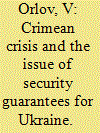

|
|
|
|
|
| Publication |
2014.
|
| Summary/Abstract |
The author offers opinions on the Budapest Memorandum, a 1994 agreement between Russia, Ukraine, Great Britain and the U.S. offering security guarantees for Ukraine in return for its nuclear disarmament. Citing the history of Ukraine's foreign relations since 1991, It is stated that since the U.S. and Great Britain have recognized the provision government created in 2014 while Russia has not, the Memorandum has no relevance to Russia's intervention in Crimea.
|
|
|
|
|
|
|
|
|
|
|
|
|
|
|
|
| 16 |
ID:
130838
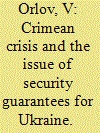

|
|
|
|
|
| Publication |
2014.
|
| Summary/Abstract |
The author offers opinions on the Budapest Memorandum, a 1994 agreement between Russia, Ukraine, Great Britain and the U.S. offering security guarantees for Ukraine in return for its nuclear disarmament. Citing the history of Ukraine's foreign relations since 1991, It is stated that since the U.S. and Great Britain have recognized the provision government created in 2014 while Russia has not, the Memorandum has no relevance to Russia's intervention in Crimea.
|
|
|
|
|
|
|
|
|
|
|
|
|
|
|
|
| 17 |
ID:
154049
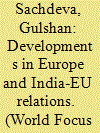

|
|
|
|
|
| Summary/Abstract |
In the last few years, Europe is facing many challenges. These include difficulties in managing a single currency mechanism, influx of refugees, crisis in Ukraine, terrorist attacks, rise of populism and British exit from the European Union (EU). Despite these difficulties, the EU is still a major economy with huge capacities to influence issues concerning global governance. As a major trade and investment partner of India, developments in Europe have significant implications for the Indian economy and India-EU ties. After a few years of sluggishness, India-EU strategic partnership is again gaining momentum with an agreed Agenda for Action 2020. As negotiations on bilateral trade and investment agreement may take time, both India and the EU are focusing on other areas where increased consultations can lead to concrete outcomes. The areas include climate change, energy, environment, counter-terrorism, maritime security, science and technology, development cooperation, migration and mobility, civil society linkages and dialogues on Asia and Africa.
|
|
|
|
|
|
|
|
|
|
|
|
|
|
|
|
| 18 |
ID:
157800
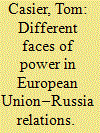

|
|
|
|
|
| Summary/Abstract |
This article applies Barnett and Duvall’s taxonomy of power to European Union (EU)–Russia relations aiming to understand power in its complexity and without a priori theoretical assumptions. Four different types of power – compulsory, institutional, structural and productive – feature simultaneously. It is argued that non-compulsory forms of power are key to understanding the logic of competition in EU–Russia relations in the decade preceding the 2014 Ukraine crisis, despite receiving limited scholarly attention. First, a struggle over institutional power, the capacity to control the conditions of the other actor indirectly, appeared from rivalling integration projects and competing norm diffusion. Secondly, power relations were strongly characterised by constitutive forms of power – structural and productive – in particular the capacity to produce and recognise identities, such as Europeanness. In both fields, the EU held a hegemonic position, which Russia increasingly challenged. The geopolitical reading of the change in regime in Ukraine in 2014 prompted Moscow to a radical change of strategy, by shifting the emphasis in the confrontation to compulsory power. Attempts at direct control, from annexation to sanctions, now dominate relations. Where Russia seeks to prevent the Euro-Atlantic community from gaining effective control over Ukraine through destabilisation, this can be labelled ‘negative’ compulsory power.
|
|
|
|
|
|
|
|
|
|
|
|
|
|
|
|
| 19 |
ID:
147223
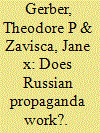

|
|
|
|
|
| Summary/Abstract |
Since the onset of the Ukraine crisis, the Russian government has stepped up efforts to promote a narrative it first introduced in the mid-2000s regarding the faults of the United States and the West; the dangers of institutions associated with democracy, such as protests and NGOs; and the superiority of Russian values and institutions. This narrative comes from official statements, diffuses via government-orchestrated Russian mass media as well as innovations such as internet “troll farms,” and is directed at both domestic and international audiences. Domestically, the arguments seek to legitimize the Putin regime, garner support for its policies, and demonize its critics. Internationally, they are part of a larger effort to project Russian “soft power,” sow doubts and uncertainty within the NATO alliance, weaken public support for policies countering Russian aggression in Ukraine, and solidify the allegiances of Russia's allies in former Soviet republics whom Russia considers part of its natural sphere of influence.
|
|
|
|
|
|
|
|
|
|
|
|
|
|
|
|
| 20 |
ID:
142988
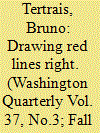

|
|
|
|
|
| Summary/Abstract |
In the past two years, the expression “red line” has become a regular feature of the global policy debate. So much so that it risks becoming a punch line. Red lines have appeared in discussions about the Ukraine crisis, Iran's nuclear program, and Syrian use of chemical weapons. President Obama famously stated in 2012 that “a red line for us is we start seeing a whole bunch of chemical weapons moving around or being utilized.”
|
|
|
|
|
|
|
|
|
|
|
|
|
|
|
|
|
|
|
|
|